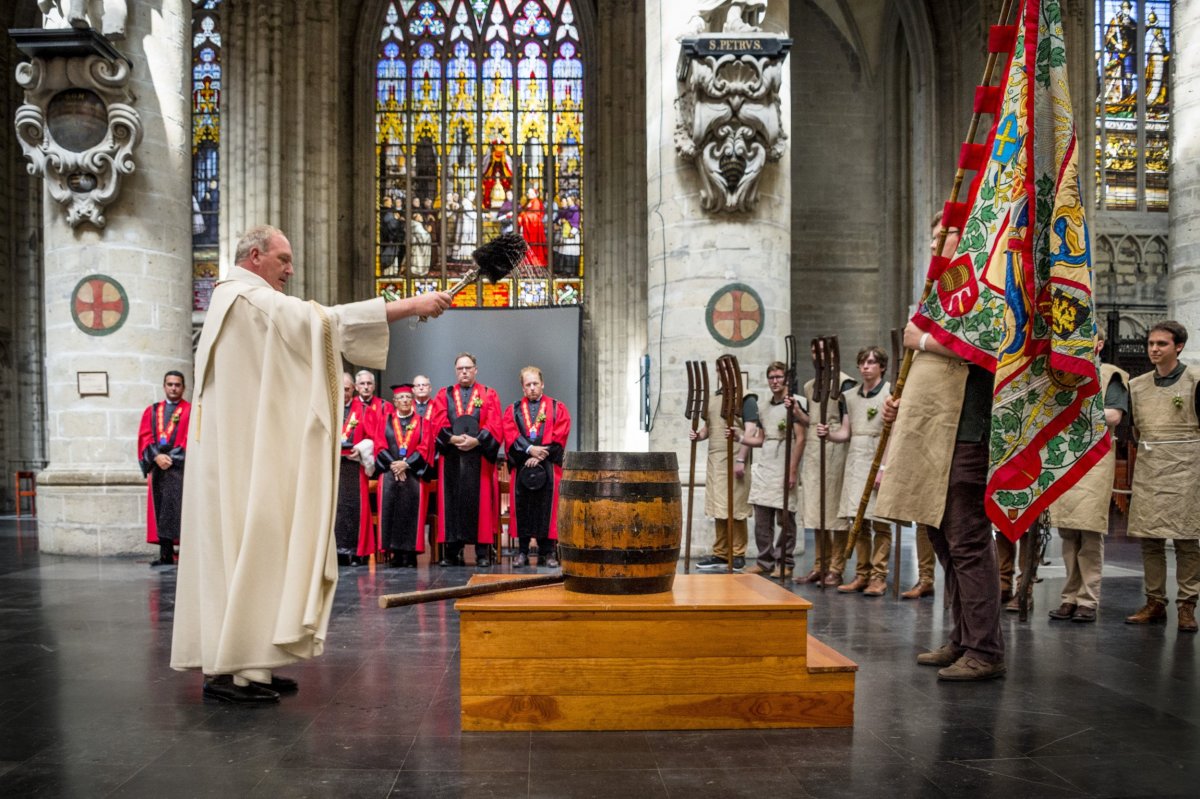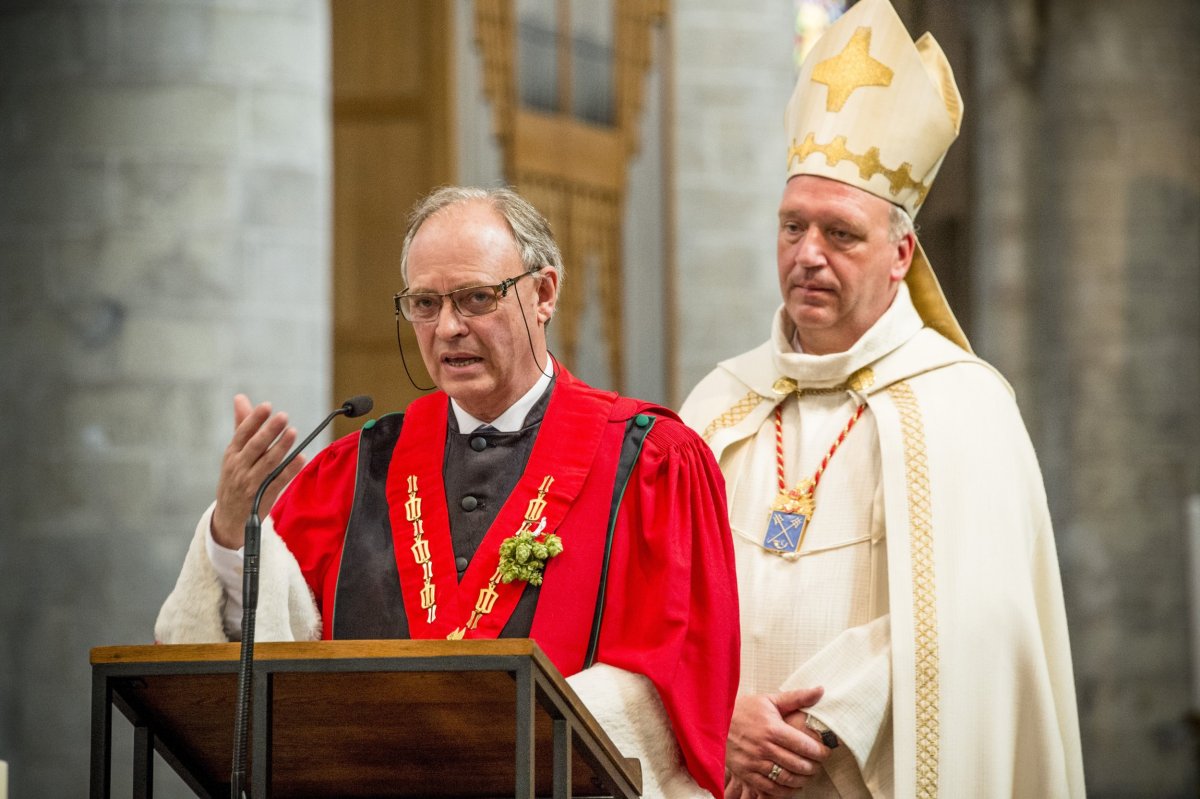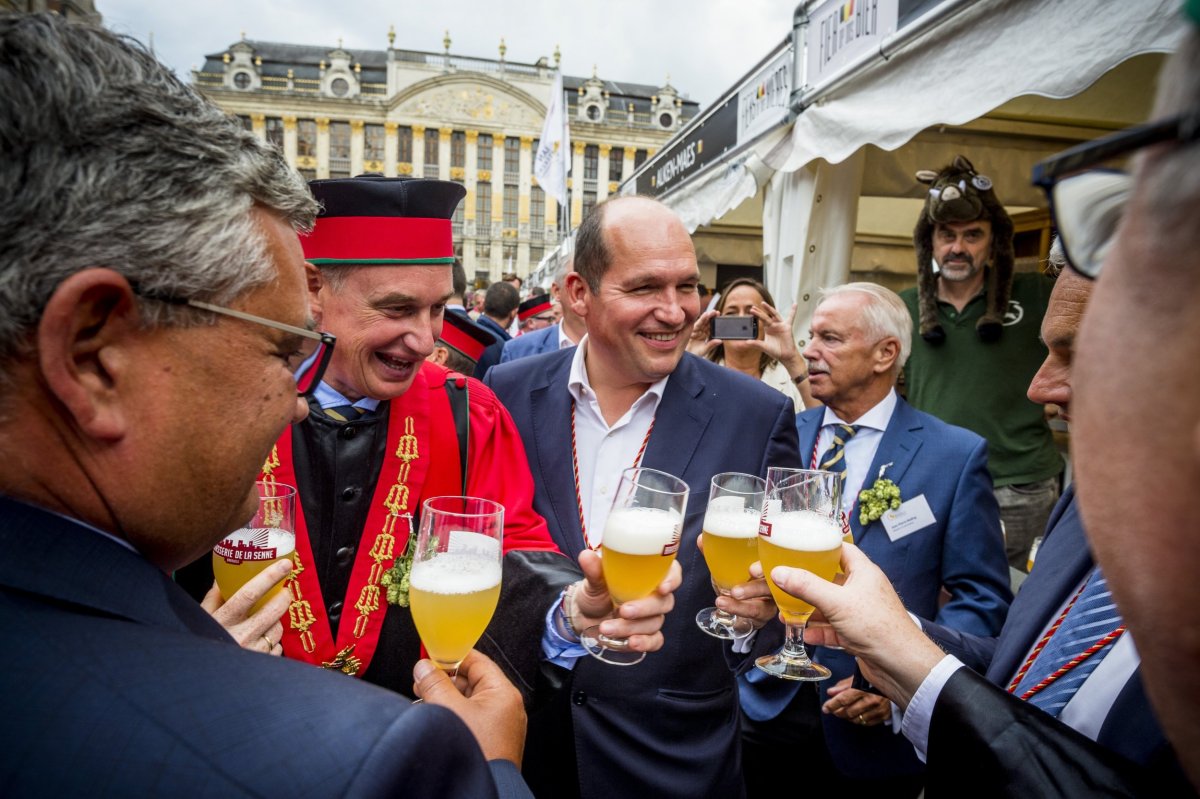Few nations have as special a relationship with beer as Belgium. In 2016, there were 224 active breweries in the nation, serving its 11.35 million people and many millions more across the world. One of the most prominent brewing nations in the world, its success is built on a long, and holy, bond with the world's favorite tipple.
On Friday, Belgium's brewers will meet to honor Saint Arnould, the patron saint of brewers, in one of the more unusual ceremonies held in Brussels each year. Known as the Knighthood of the Brewers Paddle, the group will march from the city's historic Grand Palace through the old town to the altar of the Cathedral of St. Michael and St. Gudula.
There, a consecration ceremony will be held. Dressed in traditional costumes, the knights will look on as priests bless a traditional 13-gallon wooden cask of beer. The blessing begins a weekend beer-tasting festival, held in the nearby Grand Place outside the town hall, where the city's residents can enjoy the best Belgian brews.

Belgian brewers have been celebrating Saint Arnould for more than 700 years. Born in 1040 in the small west Belgian village of Tiegem, Arnould's father was a noble and a brewer, meaning the boy learned the secrets of the trade from an early age. He eventually became a soldier, before turning his back on violence and became a monk. Arnould later rose to become a bishop, and died in 1087 in Oudenburg.
Arnould is credited with a miracle that gave him the status of patron of brewers. So the story goes, the plague was sweeping through Flanders, contaminating water and making all those who drank it ill. Arnould supposedly dipped his staff into a brew kettle—used to ferment beer—after which all who drank from the vessel were immediately cured.
Whether true or not, beer and the Catholic Church have gone hand in hand for centuries in Belgium and across Europe. Monasteries were vital sources of the beverage, monks using their large numbers, knowledge and time to brew beer for their own consumption and that of their local communities.
Jeffrey Pilcher, a food and drink historian at the University of Toronto, told Newsweek, "The relationship between monasteries and religious institutions and brewing goes way back," noting that even Charlemagne—the first Holy Roman Emperor—had court brewers drawn from religious bodies.
For most of human history, what we think of as beer did not exist. Traditional recipes produced a drink far sourer than we would be used to, and often weaker too. Pilcher noted monks are credited with a host of advances to create what so much of the world enjoys today, including the introduction of hops and the idea of lagering—or cold storing—beer to improve flavor.
More traditional beers still exist, and many can be found in Belgium. "People refer to Belgian farmhouse beers as being this kind of museum of what brewing was like before the advance of scientific brewing," Pilcher explained. "I think that some of these Belgian sour beers are really more like what everybody was drinking before the late 19th century," after which hopped beer became more common.
Reminders of the relationship are prominent, even away from set pieces like Brewer's Day. Frank Boon, the Grand Master of the Knighthood of the Brewers' Paddle, told Newsweek that that in his home town of Lembeek, there was a baptismal font bearing the inscription "Gift of the brewers, 1716."

"In small communities hundreds of years ago, it was the local duke, the priests, the brewers and the lord mayor," Boon said. "They made the village. And the doctor maybe later!"
Of course, much has changed since then. Commercialization and the decline of traditional religions mean the two bodies have diverged. Despite Friday's celebration, "There is no special link between the church and brewery in Belgium," Boon noted. "It's more considered a part of our cultural heritage."
This year's celebrations hold special significance as they will mark the 20th anniversary of the Grand Place beer festival, with Belgian Prime Minister Charles Michel set to become a member of honor of the knighthood.
Traditionally, the consecration and subsequent brewers feast was held on a Wednesday morning, but the introduction of the beer festival prompted organizers to move the celebrations to a Friday. "More than 500 beers will be available to taste—you cannot do that on a Wednesday morning," Boon explained.
Anyone involved in the brewing process in Belgium can become either a Knight of Honor or a Knight of Right, Boon said. From brewery owners all the way down to factory workers, the organization is a platform for the whole industry. This means there will be 300 or 400 people attending the post-consecration feast, Boon noted, a challenge for any caterer. The total number of members stretches into the thousands.
Belgian beers are famous across the globe, buoyed by the country's status as one of the drink's spiritual homes. The knights take their craft to other beer powerhouses as far away as the U.S., South Africa and Russia, Boon said.

The rapid commercialization and globalization of the beer industry after World War II offered great opportunities to the Knighthood, guiding its members to become business-minded. The country is now the third largest beer exporter in the world, with sales topping $1.7 billion in 2017.
The knights are the guardians of the country's long history of brewing, which is so central to the national culture. "Beer unites people in Belgium," Boon told Newsweek. "Refreshing beers in the summer, strong, warming beers in wintertime, in fact there is a beer for every occasion!"
Indeed, for Boon and his fellow connoisseur compatriots, life's pivotal events call for a special effort. "If you do a wedding you say, 'What kind of beer should we create? Maybe this one to start the day and then create a selection of three for the evening.' That is Belgium!"
Even the youngest Belgians partake. "When I was a boy there was no Coca-Cola, it was forbidden at home," Boon said. "It was considered that beer was safe and that you could drink it, but all the others things were suspect."
Uncommon Knowledge
Newsweek is committed to challenging conventional wisdom and finding connections in the search for common ground.
Newsweek is committed to challenging conventional wisdom and finding connections in the search for common ground.
About the writer
David Brennan is Newsweek's Diplomatic Correspondent covering world politics and conflicts from London with a focus on NATO, the European ... Read more
To read how Newsweek uses AI as a newsroom tool, Click here.








